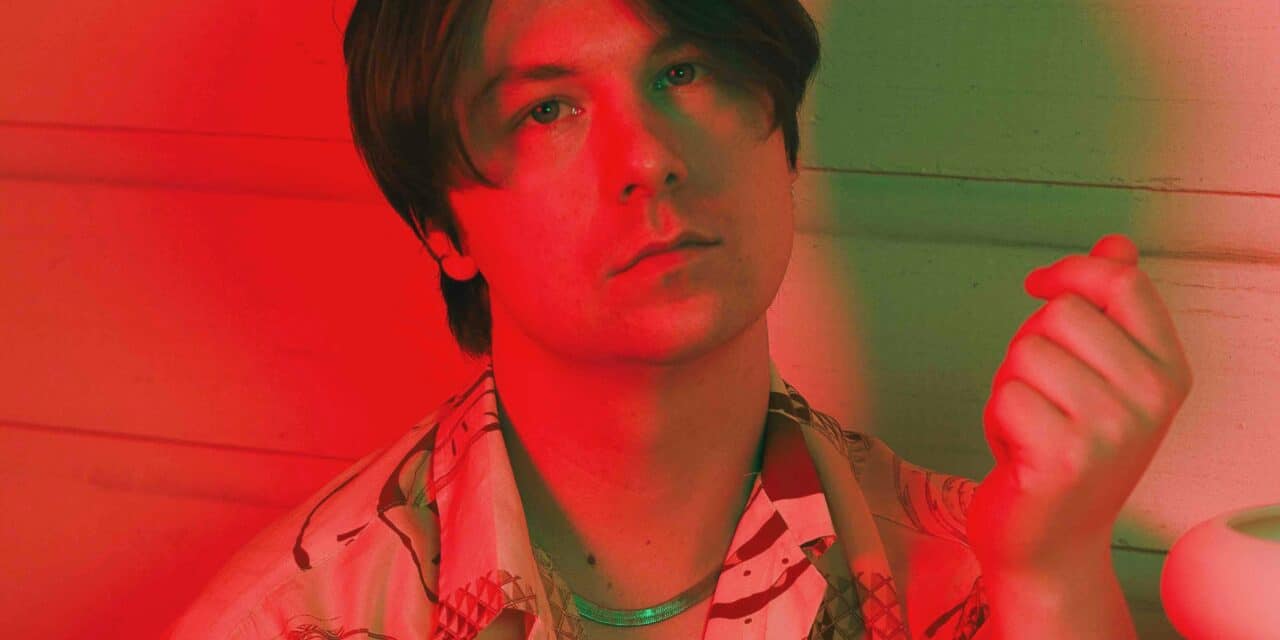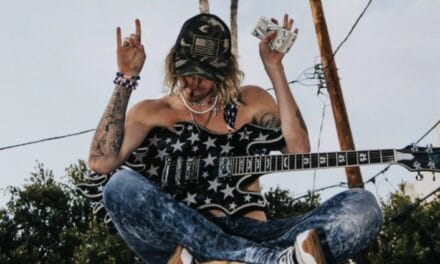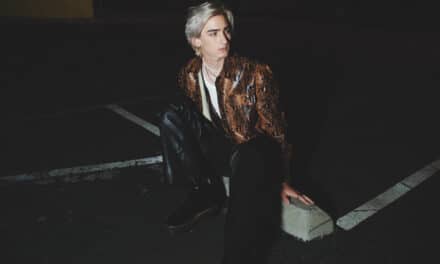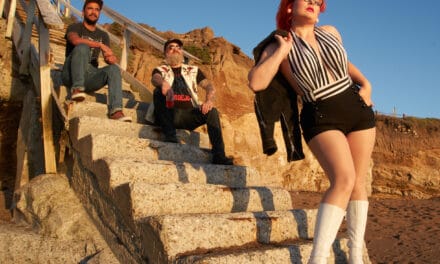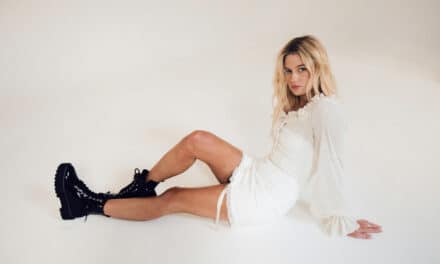Phantom Limb shares their brand new full-length LP, Pastoral, via Earth Libraries. Speaking on the album, frontman Andrew Laningham wrote:
“Pastoral is a meditation on the concepts of home, memory, the South, and paranoia. The songs comprise a loose narrative about coming to terms with the idea of home as imperfect, and kind of sinister. It’s also about the internet being overstimulating to the point of numbness, and figuring out the differences between how you see yourself and how you exist in the real world. I wrote a record about the South, my relationship to it, and its relationship to me.
I wanted Pastoral to sound like it was being haunted by old AM radio signals, but I didn’t have much experience recording or have access to professional equipment. What I did have, though, was some microphones, guitar amps, a synthesizer, and a pretty large collection of tapes I found sifting through thrift stores in rural Alabama.
Those tapes ended up defining the sound of Pastoral. All of the instruments on the record (outside of guitars/bass/drums/synths) came from samples of cassette tapes that I found. A lot of the tapes that I was listening to were home recorded by the people that lived near me. I found these types of samples intriguing because they grounded the record in a very specific place: Alabama.
What do you want your music to communicate?
I guess I would like my music to communicate a sense of anxiety. I deal with anxiety a lot, and I think that comes out in the music. Sharing that feeling with other people makes it a little easier to deal with. Also, I want my music to communicate that sense of catharsis you get from pushing through that anxiety, because I think that’s the mirror image of being trapped in an anxiety induced thought loop.
What are some sources of inspiration for your storytelling?
For this record, I was really interested in the American South (where I’m from) as a concept and as a signifier. I really wanted to write about my relationship to the South and its relationship to me. So, I threw in a lot of references to Alabama in the lyrics and samples. I wanted to make a record about the South, but stripped of all of the musical tropes someone would regularly associate with “Southern Music”
Anxiety is also a big source of inspiration for me. It takes your mind in really weird places, and is a never ending well of lyrical inspiration. Nostalgia too. I like intertwining nostalgia and anxiety in my lyrical and musical choices. I think in some sense nostalgia is inherently anxiety-inducing. To me, nostalgia makes you scared about missing out on something from the past, while worrying
about whether the future is going to be as good as your memories. That’s a lot of what I draw from as a lyricist.
Who is an artist that you look up to more than others today?
I really look up to artists that subvert expectations and make something unexpected and new with each release. I think there’s a lot of great music coming out of Philadelphia right now (e.g. Body Meat, Spirit of the Beehive, ARTHUR, Palm, and Kristine Leschper). Also, there is a lot of really cool stuff coming out of Atlanta that is super underappreciated (like Karaoke, Greenscreen, and Klark Sound). All of these artists play with nostalgia, internet culture, and song structure in a way that really inspires me. JPEGMAFIA, Injury Reserve, and Pet Shimmers fit this bill as well. I’m always really inspired by music that recontextualizes sounds and flips them on their heads.
The artist that I’ve looked up to the most is Rev. Fred Lane. He’s an experimental musician from Alabama that put out these wacked out big band records in the late 70s and early 80s. Think Frank Sinatra or Bing Crosby on bath salts. He was a part of a larger experimental arts group from Tuscaloosa, AL called Raudelunas, who did a lot of experimental art and music performances. The thing that inspires me about Rev. Fred Lane and Raudelunas is that they were experimental and transgressive in a setting (1970s Alabama) that was completely hostile to the art they were making. They didn’t have the support of a scene like No Wave era New York or Fluxus. They were truly rebelling against something that was in their backyard, like the regressive politics and social norms of 1970s Alabama. And, Rev. Fred Lane is still making art
and music today. That’s something I aspire to: continuing on making things that I care about 40 or 50 years after I started.
What’s the record or artist that made you realize you wanted to be an artist? I think Daniel Pujol (and by extension the larger garage rock scene in Nashville happening around the early 2010s) was what made me decide to become a musician. I snagged a copy of his single, “Black Rabbit” when I was 14 or 15 on a trip from Alabama to Nashville. I grew up in a really rural part of Alabama, so I didn’t have any idea about DIY music scenes or any type of music that wasn’t on Fuse (remember that TV channel). When I first heard Pujol’s music, I hadn’t really listened to anything like it. The lyrics were really intricate and smart. The songs were really catchy. And, the musicianship was really tight. Pujol was the first band that showed me guitar based music didn’t have to be Lynyrd Skynyrd or AC/DC.
I remember the first time I went to one of his shows in Nashville. I was expecting some type of formal concert, like going to see ZZ Top at a concert hall. When I rolled up to the venue, I instead saw a handful of regular people hanging out. Then, Pujol came out of the crowd and went on the stage, played a set, then came off the stage and was in the audience for the next band. That dissolution of performer/audience dichotomy was wild for me at the time. It made me realize: “Hey, I can probably do this too!” So, I just kind of did.
Tell us about your latest release and how it came about
See Press Release e.g.:
Pastoral is a meditation on the concepts of home, memory, the South, and paranoia. The songs comprise a loose narrative about coming to terms with the idea of home as imperfect, and kind of sinister. It’s also about the internet being overstimulating to the point of numbness, and figuring out the differences between how you see yourself and how you exist in the real world. I wrote a record about the South, my relationship to it, and its relationship to me.
I wanted Pastoral to sound like it was being haunted by old AM radio signals, but I didn’t have much experience recording or have access to professional equipment. What I did have, though, was some microphones, guitar amps, a synthesizer, and a pretty large collection of tapes I found sifting through thrift stores in rural Alabama.
Those tapes ended up defining the sound of Pastoral. All of the instruments on the record (outside of guitars/bass/drums/synths) came from samples of cassette tapes that I found. A lot of the tapes that I was listening to were home recorded by the people that lived near me. I found these types of samples intriguing because they grounded the record in a very specific place: Alabama.
I was reading a lot of Mark Fisher’s writing on Hauntology when making Pastoral. Fisher talks about how nostalgia and the past can impede our ability to conceptualize the future. Unintentionally, I made a record that illustrates that idea and contextualizes it in the South. Most
of the songs on Pastoral are about how the past can still haunt the present in one way or another, and the sonic palette of the record is supposed to feel like songs being swallowed by symbols of the past. I think the central idea of the record is this: nostalgia can be comforting, but sometimes you have to let nostalgia go in order to move forward in life.
What inspires your sound?
Late-night YouTube rabbit holes. All of the cassettes in every thrift store. Crocs. VHS tutorials about how to access the internet. Internet tutorials on how to access your VHSs.
Really, I think the thing that most inspires my sound is the warping of nostalgia. Recontextualizing familiar sounds in new ways is what really interests me now. I’ve been really into writing a song with traditional instrumentation, and then stretching that out, speeding it up, or processing it with effects. I’m also really into digging for obscure samples. I try to stay away from sampling music that I already like. Sampling from sounds that I’m not familiar with makes it easier for me to put them in different, more interesting, contexts.
What’s your favorite tune of yours?
My favorite song on Pastoral is probably “Pastoral II.” That was the last song I wrote for the album. I had a tough time with it at first, and had trouble making the song not sound like an Elliot Smith-esque ballad. I was able to change the song structure around, and warp all of the instruments into a wall of sound that took the song into a different place. I think it’s the most optimistic song on the record as well. It’s all about striving to change yourself for the better in face of anxiety and stagnation. I also got to sample a story my grandma told me about drastically changing her life at the end of the song. With “Pastoral II,” I was able to wrap up the narrative of Pastoral in a satisfying way.
Where are some things you really want to accomplish as an artist?
The only thing I really want to accomplish is to continue making interesting art. I want to continue to change and have each consecutive album be an extension of the previous one. I feel like I’ve already accomplished a lot, and I’m stoked that people are listening to my music already. I guess I’d like to tour the US and Europe extensively. That would be tight. I’ve been itching to play more shows since COVID-19 happened.
Favorite lyric you ever wrote?
Probably “It comes at you alone, wild eyed and estranged” from “Dumbo Returns.”
That lyric encapsulates the feeling I get when I sense anxiety coming on. “Dumbo Returns” is all about feeling trapped in a thought loop, and the weird rabbit holes your mind can take you down in isolation. I think that lyric captured that unnameable feeling more than anything else I’ve written so far.
Was there ever a moment when you felt like giving up?
No, not really. I don’t even know what giving up would look like. It sounds kind of cliche, but making music is so central to my identity, that I can’t imagine not doing it. I’m lucky in that I have a setup where I can make records and music at my house by myself. So, I think I’ll always be making music and experimenting in some fashion.
Also, playing live is ultimately an excuse to hang out/travel with my friends, and share something I made with people that might enjoy it. For me, making music is about communicating with other people and cataloguing different times/experiences in my life. So, it’s hard for me to see a future where I’m not making records and performing. I’m totally cool with being the old dude playing shows and making records in his 60s like 40 years from now. I just hope that music is still trying something new and experimenting with interesting ideas.
What is the best advice you’ve ever gotten?
My dad always told me that the best way to get something done the way you want it is to do it yourself. I’ve always taken that to heart. Following that advice has been pretty solid for me. I’ve taught myself how to record and produce music, play a bunch of different instruments, and make music videos by myself. It’s cool to learn a new skill and produce something I’m really proud of. I think that advice lends itself well to being an independent musician, because a lot of the time you don’t have the money for an expensive recording studio or music video setup. It also helps out with booking tours and setting up shows.
On the other hand, Peyton (who plays bass in Phantom Limb), has recently given me the advice to start relying on other people and start being okay with saying “no” to things. Letting other people help me with creative stuff has also been really clutch in keeping my head above water and not feeling overwhelmed.
I think it’s all about finding the balance between being self-sufficient, but also having a tight support network of people that I can trust to help me with important creative tasks.
Where do you think the next game changer will be in the music industry and entertainment scene?
Probably something that has to do with making the creation of music even more accessible to the everyday person. Music is already super accessible all the time to the consumer, to the point where it means it’s hard for most artists to support themselves with just their art. I would love it if the next game changer would be centered around a direct relationship between the artist and audience. But, since we live in a late-stage capitalist hellscape, it’s hard for me to see that happening.
So, I think the next best thing is for music making to become even more accessible to the everyday person. I could see a music making app with a super intuitive user interface that requires no prior music knowledge being a really cool way to further democratize the music making process. It would be wild to hear what people would come up with if making music was even easier to do. TikTok is already headed in that direction, and I think some really cool stuff is coming out of that.
If that can’t happen either, maybe we’ll get a critical reevaluation of the Baha Men. I’m ready for “Who Let the Dogs Out”-esque jams to be back in the mainstream. Music can be too serious sometimes. I’m waiting for the day that I can scream Baha Men lyrics at the top of my lungs and not feel like a dweeb.

